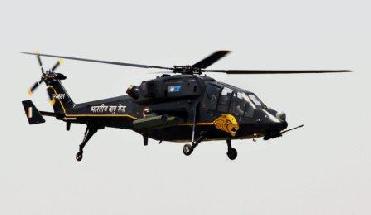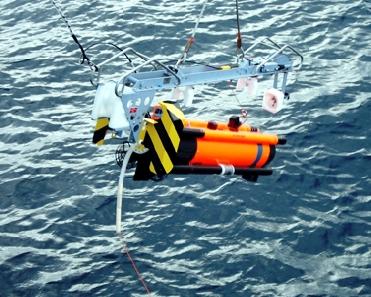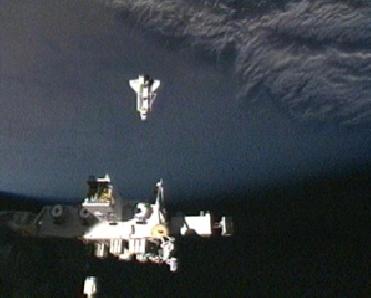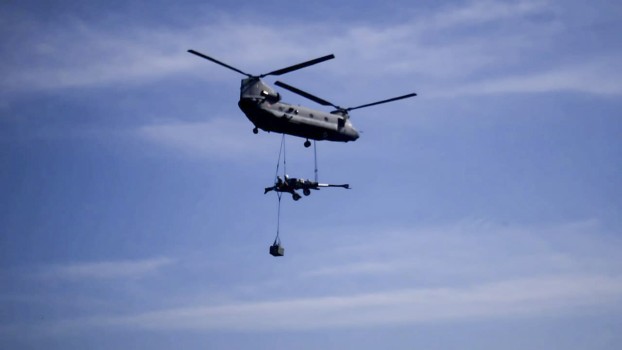
India's first indigenous Light Combat Helicopter making its maiden flight at the HAL airport in Bangalore on Sunday. PTI Photo
BANGALORE (PTI): India's first indigenous combat helicopter capable of participating in anti-Naxal and counter terrorism operations Sunday took to the skies, marking its first official flight at the HAL airport here.
The Light Combat Helicopter (LCH), designed and developed indigenously by the Hindustan Aeronautics Limited (HAL) in four years since the project began in 2006, is likely to be ready for induction by the Army and Air Force before 2014.
Witnessed by IAF Vice Chief Air Marshal P K Barbora and Defence Production Secretary R K Singh, the 10-minute flight display caught the attention of those present at the venue, with the 5.8-tonne chopper showcasing its manoeuvrability and stability, including one of the most difficult moves --reverse slide.
Defence Minister A K Antony and IAF Chief Air Chief Marshal P V Naik did not attend the event in view of the tragic air crash of a civilian flight in Mangalore Saturday which claimed 158 lives.
"It is a red letter day for not only HAL, but the whole nation. I am quite positive the aircraft will meet all IAF requirements in this class of helicopters. The first display has been superb," Barbora said at a function soon after witnessing the maiden flight of the LCH.
He said very few countries around the world had the capability to indigenise a helicopter of this class, but at the same time cautioned HAL that it must learn from its past mistakes and not repeat them.
Barbora said though the helicopter was bulky and heavy, it was a versatile aircraft and the problems with its weight would be solved as years go by.
Singh, in his address, said LCH was a "truly fine" machine and the indigenous development of the helicopter had both strategic and economic reasons.
He said it was important for a country to be independent of other nations when it comes to its defence production and research and development capabilities.
Moreover, import of weapons led to job creation in other country, as India spent billions every year to equip its armed forces.
"I would like to set a deadline of four years from now for the LCH to be inducted into the armed forces and I feel it is a reasonable time frame for HAL to achieve," he added.
HAL Chairman Ashok Nayak said the Defence PSU had already bagged an order for supplying 65 of these combat helicopters to the IAF and the Army.
Though a derivative of the Advanced Light Helicopter (ALH) 'Dhruv' was already inducted into the armed forces for passenger and cargo transport, LCH's primary roles would be in air defence against slow moving aerial targets, destruction of enemy air defence operations, provide escort to heliborne special operations, counter surface force operations, anti-tank and scout duties.
It can be used effectively by paramilitary forces in their anti-Maoist operations in Central India and by Army in counter-insurgency operations in Jammu and Kashmir and the North East.
For that purpose, the LCH is armed with 20-mm turret gun, air-to-air and air-to-ground missiles, anti-radiation missiles, 70-mm rockets, and cluster or iron bombs, defence officials said.
It also has Nuclear-Biological-Chemical (NBC) attack protection, electronic warfare suite and counter-measures when it comes under enemy fire.
The chopper has advanced features such as night operation capability, armour protection, a glass cockpit with tandem seating for two pilots and stealth features.
The helicopter, powered by twin Shakti engines developed by HAL in association with French Turbomeca, can achieve a top speed of 268 kmph and has a range of 550 km with internal fuel tanks. It can extend its range by another 250 km using drop tanks, they said.
For enhanced survivability of both the aircraft and crew, LCH would have a crash-worthy bottom structure, tail wheel landing gear and pressurised cockpit with NBC filters.
Since LCH is based on a successful and proven Dhruv design, the project cost of the combat helicopter is likely to be as low as Rs 3.76 billion.
Prior to its maiden official flight, the LCH had done about 25 rounds of trial flying in the Bangalore skies over the last two months to prove the effectiveness of its systems.
 Previous Article
Previous Article Next Article
Next Article













The Indian Air Force, in its flight trials evaluation report submitted before the Defence Ministry l..
view articleAn insight into the Medium Multi-Role Combat Aircraft competition...
view articleSky enthusiasts can now spot the International Space Station (ISS) commanded by Indian-American astr..
view article